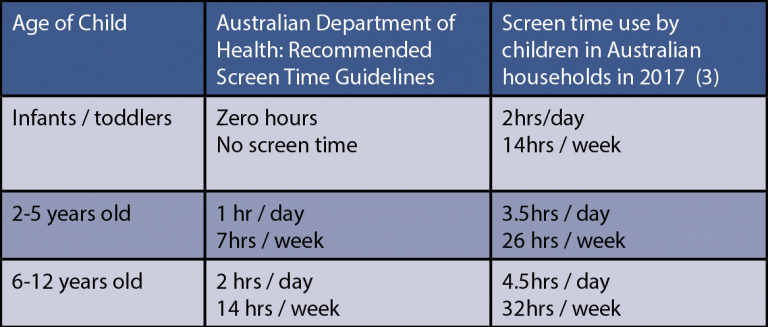Screen Time and Visual Development Advice for Parents
As society becomes increasingly reliant on technology, and more children spend time indoors on their screens, concerned parents are often asking orthoptists: Does screen time affect my child’s vision?
Screen use has been associated with a number of health concerns in children, including developmental outcomes, obesity, poor sleep quality, ADHD and eye development (1). This has led to the development of Screen Time Guidelines by respected bodies such as The World Health Organization (WHO) (2).
So, how much screen time is recommended for children? Figure 1 below highlights how, even in 2017, Australian children were using mobile devices and screens much more than the recommended guidelines.

Figure 1 demonstrates recommended screen use versus actual use in Australian children.
The effects of too much screen use on children’s eyes is well documented.
Myopia, a common condition which can be inherited, is becoming more prevalent worldwide. The WHO predicts that by 2050, myopia prevalence will reach 52% (2). It’s been well established that an increase in myopia prevalence and progression is partly due to excessive near work activities such as screen time, combined with increased time spent indoors, and partly due to lack of exposure to the outdoors (4).
As we know, myopia is incredibly important to manage because if it progresses to into ‘high myopia’ – five dioptres or more – it’s associated with sight threatening complications such as glaucoma, retinal detachment and myopic macular degeneration (5).
Research has shown that spending more time outdoors, as little as 40 minutes more a day, may slow down myopia progression in children (6).
The orthoptist will be able to detect the presence of myopia, or other problems, by assessing the focusing ability of the child’s eyes in a detailed eye examination. If diagnosed, advice on treatment options for myopia will be provided in the eye clinic at the end of the child’s examination.
During the examination, there are several additional conditions the orthoptist may detect which may be associated with near work.
If a child spends too much time looking at their screen they may develop digital eye strain and develop symptoms such as headaches, blurry vision, itchy or dry eyes.
If digital eye strain is diagnosed in a child, it’s the orthoptists role to educate the child on the importance of resting their eyes during extended periods of near work. They may prescribe activities such as trying to blink more often during near work, or looking into the distance for a period of 20 seconds every 20 minutes to give the eyes a break from continuous near work.
Convergence insufficiency (CI), a condition that makes it difficult for the eyes to work together on near tasks, can result in symptoms such as headaches, double vision for near work, floating letters on the page and blurry near vision. Although CI is not caused by screen use, if a child has CI, they may notice the onset of symptoms after any near work.
The orthoptist can detect CI during a routine eye examination and can manage the condition to relieve the symptoms. The most common form of treatment is orthoptic eye exercises, which the child can perform at home to train up the muscles in and around the eyes, which helps the eyes work better together during near work (7).
For parents, the take home message should be to try and balance the amount of indoor screen time their child performs with daily outdoor activities, and to include periods of resting the eyes when spending extended amounts of time on near work and screen use.
If the child is experiencing any symptoms related to near work, an eye examination is recommended. Orthoptists, who are specialised in the detection, diagnosis and management of ocular disorders in children can provide advice on a wide range of ocular conditions in children, including those mentioned in this article.
ABOUT THE AUTHOR: Cathy Lewis is the Chief Orthoptist at the Royal Children’s Hospital Melbourne and a casual lecturer in orthoptics at La Trobe University.
Article provided via: insightnews.com.au/oaw-screen-time-and-visual-development-advice-for-parents/
